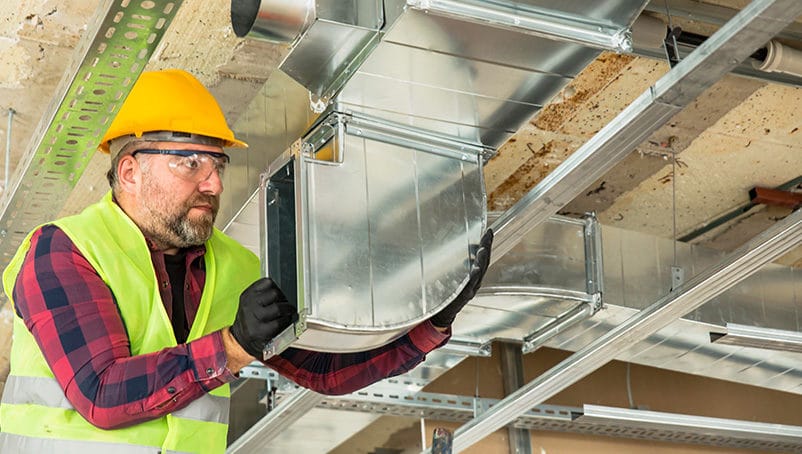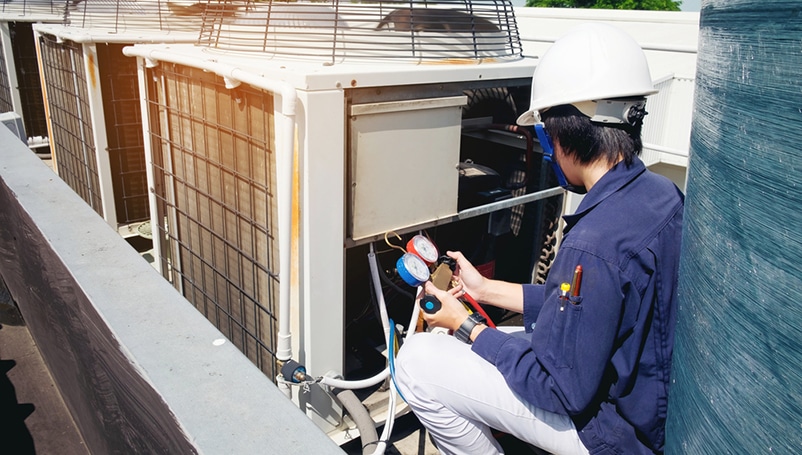Texas is famous for its variable weather. There’s almost no weather type that doesn’t hit some part of the state of Texas. From hurricanes to snow storms and blistering heat, Texas has it.
This makes a functional HVAC system a necessity. And a good HVAC system needs a technician with the proper training to install and maintain it. If you are considering an HVAC career in Texas, read on to learn more about how to get started in this field.

How to Get HVAC Certified in Texas
HVAC certification is not all about having a certain level of education. Instead, it showcases a level of education that goes beyond your license. It is testimony that you have acquired the necessary information, knowledge, and experience that you should have to handle HVAC equipment. Your certification could also be in a specialized subject in the field.
However, do not confuse your certification with your license. Your certification is a part of the entire process.
The first thing that you need for an HVAC certification is a training certificate
Local colleges can help you in signing up for courses that will allow you to complete the necessary coursework and apprenticeship in less than 12 months
The exact specifics of the certification depend upon the certificate you are pursuing. You might be required to take multiple courses, whereas some certificate-issuing bodies will just demand one. You could be expected to produce evidence that you received hands-on training, or have relevant experience, or could even be asked to sit for an exam. Therefore, ensure that you have thoroughly checked the requirements of the certificate you want and that you have completed them all.
How to Get HVAC License in Texas
Having a license is mandatory if you want to work as an HVAC technician in Texas. The good news is that obtaining it is not extremely difficult, and if you educate yourself on the process, then you shouldn’t run into any problems.
The first thing you need to do is get yourself registered as an ACR Technician. There is no exam for this; it gives you the credentials to get experience under a licensed HVAC technician.
In the last six years, you need at least four years of experience with refrigerators and ACs under the supervision of a licensed HVAC technician.
After this, you take the contractor’s examination. While this test is open for convicted felons, it is at the discretion of the licensing body to reject or accept their application.
To appear for the exam, you have to be at least 18 years old.
- The types of licenses are discussed below. These dictate which exam you will sit for.
- If you score 70% or above, then you clear your exam and are granted a license. However, if you do not pass this exam, you can take it again as many times as you want.
- Your license, however, needs to be renewed after every year, for which you are required to complete eight hours of continuing education training.

How to Study For the Texas Licensing HVAC
The test doesn’t have any prior educational requirements. Nevertheless, you can still find institutions like Southwest Texas Junior College or Texas State Technical College, or any other local trade school offering courses that can prepare you for topics that will be a part of the exam.
The test is conducted by the Texas Department of Licensing and Regulation. This body offers two kinds of licenses; hence there are two types of tests. The Class A license test has 120 questions that you have to solve in 240 minutes. The Class B license test has 100 questions for which you will get 180 minutes. You need to score at least 70% on your test to be eligible to receive a license. However, on the off chance that you fail, you can reschedule for the test within 24 hours for the same fee.
The topics included in your exam would be Combustion Safety, Refrigeration Components, Regulations and Law, Pressure Relief Safety, HVAC Systems, Refrigeration Concepts, Ductwork, and Ventilation. Therefore, whether you decide to utilize online resources, take a course, or hit the local library, make sure that you cover these topics.
Different Types of HVAC Certification in Texas
There are four different types of HVAC licenses that you can obtain in Texas: Class A, Class B, NATE, and EPA Licenses. The details of all of them are mentioned below:
Class A License
This is the license that covers units of all sizes and heating capacity. Therefore, if you intend to work as an industrial or commercial HVAC technician, this is the license you should go for. It also has a handsome average annual salary.
Class B License
This license is similar to the Class A license with only one difference: it puts a restriction on the technician to not work on units heavier than 25 tons or those that have a heating capacity of over 1.5 million BTUs. Technicians with this license might get paid slightly less than technicians with a Class A License.
NATE
The North American Technician Excellence organization issues this certificate. This is not a legal requirement but can add to your resume. It ascertains that you have sound experience and knowledge about HVAC equipment and are a professional. This can add around $10,000 to $20,000 extra to your salary.
EPA Licenses
Licenses from Texas are inclusive of EPA refrigeration. This allows you to work on units that have refrigerants as components. Hence, it doesn’t warrant any added work or have an impact on how much you earn.
What Makes Texas a Great Place to Start an HVAC Career?
An HVAC career can be rewarding in America in general; however, pursuing one in Texas could have its perks. Read on to find out why:
Population
With a population of 29 million people, Texas is one of the most heavily populated states in the US. It is the state with the second-largest population. Moreover, this number is increasing with time with a strong population growth rate. This means more and more people require the services that HVAC technicians provide, as almost every house needs a heating and cooling system.

Industrialized State
Texas is a state that does well economically. It is also an industrialized state, which means there is a high demand for a large heating and cooling systems to be installed in large buildings. Since the state does relatively well in terms of money, you can expect to be paid reasonably well for your services.
Nature of Work
If you work as an HVAC technician in Texas, you will need to work indoors and outdoors as Texas has an active nature of work. You would also find yourself jumping from one project to another on various sites. This is much better than spending the better part of your day behind a computer or a desk and has health benefits as well. You could have a reduced risk of cancer or heart disease and would be less prone to type 2 diabetes.
Job Outlook and Salary For HVAC in Texas
The job market for HVAC techs in Texas is pretty favorable. Since this is a large state with a dense population, there are plenty of employment opportunities in this occupation, more so than other sectors. As per the Bureau of Labor Statistics 2019 data, the job growth in all other sectors will amount to around 7%. However, the average job growth for HVAC technicians was expected to be at a whopping 15 to 16%.
What is the Demand For HVAC Technicians in Texas?
Job opportunities for HVAC technicians in Texas are pretty decent. It is the state with the third-highest employment level in the occupation. Therefore, there is a steady demand for the profession. According to the US Bureau of Labor Statistics, in 2019, there were 26,690 jobs for HVAC technicians, and the number is expected to rise.
How Much Do HVAC Techs Make in Texas?
The mean annual income for an HVAC technician in Texas is around $45,753. This number could go up and down, depending upon your years of experience and level of expertise.
Entry Level
An entry-level job would pay you $41,750 per year.
Mid-Level
An intermediate level job would pay you somewhere around $56,400 per year.
Master-Level
An HVAC expert in Texas could earn up to $62,656 per year. A supervisor could earn as much as $74,012 annually.
Insurance and Tax Information For HVAC Techs in Texas
HVAC technicians provide us with valuable services, and everyone that wants their heating, cooling, ventilation, or refrigerating systems installed, repaired, or serviced rely on their expertise. They also put themselves at risk for us; hence, a lot of insurance companies have packages designed for them.
Different insurance companies offer different deals and packages that are customized to your needs. Some examples are commercial general liability insurance, professional liability insurance, commercial property insurance, and workers’ compensation insurance.
Taxation depends on how much money you are earning per year. It could also depend on the type of job you have: whether you are working as a contractor on different projects, you have a lump-sum contract, or you are working with a company.
Texas Cities With Highest Average HVAC Salaries
As mentioned above, Texas is a state that generally pays well to HVAC technicians. This profession usually has a steady demand because people always want heating, cooling, ventilation, and refrigerating systems, whether it is to get them installed, serviced, or repaired. However, some cities pay more than others. Some high paying cities include:
Austin
Austin is the city that pays the most to HVAC techs in Texas. The average per hour wage for an HVAC technician, there is $25.50. With your bonuses and commissions, you can expect to see that number rise as well.
Dallas
Dallas isn’t far behind Austin and has a mean per hour rate of $23.84. This is a very favorable city for HVAC technicians because of good money and because they have a decent job outlook for this profession. The nature of work is active, and the working conditions and environment are also pretty stable.
Pflugerville
This is another city that rewards HVAC techs well in terms of money and has an average per hour rate of $23.55. Like most jobs, that number could increase with better experience, expertise and skills, and appreciative performance reports.

People Also Ask
We understand that some of our readers might still have some questions. Therefore, we have added this section in which we have answered some common questions that people have about pursuing a career as an HVAC tech in Texas.
How Much is an HVAC License in Texas?
The license in itself doesn’t cost you anything. However, the contractor examination has a fee of $115. If you fail, then you have to pay this fee again to reappear for the exam as many times as you reappear. This is the only cost involved.
How Long Does it Take to Get HVAC Certified in Texas?
This depends on the path you choose to become an HVAC tech. If you take a course at a community college, it could take you from six months to two years to complete your education. After being registered as an ACR technician, you study under a licensed HVAC tech to gain experience of five years and pass the test.
How Much Does an HVAC Tech Make in Texas?
Several factors could determine how much money you make. These include your education, years of experience, expertise level, networking and references, and performance reports. However, the average annual salary for an HVAC tech in Texas is $45,753.
Does Texas Require an HVAC License?
In the United States, the licensing procedure for HVAC techs differs from state to state. Some states have their distinct licenses; some accept licenses from other states, whereas some don’t require a license at all. Texas, however, is a state that requires an HVAC license.
How to Apply For HVAC License in Texas
You need to pass the contractor’s exam to obtain an HVAC license in Texas. However, to sit for the exam, you need an ACR registration and need to be 18 years old. You also need experience of five years. If you have been accepted for the exam, you can schedule your test date and time by calling PSI at 1-800-733-9267.
What States Are Reciprocal With Texas HVAC License?
Some states do accept the licenses issued by another state to work as an HVAC technician. Texas presently has reciprocal licensing agreements with two states, South Carolina and Georgia.
However, you should have your out-of-state license for at least one year so that you can reciprocate.

What Qualifies You to Be a Top End HVAC Technician in Texas?
There is no one straight path to success. You can take different roads. However, a few factors can help you with this. If you have the relevant education, then that will not only help you to pass the test but will also give you a chance to learn the skill from qualified teachers. Moreover, your experience in terms of years and where you were working or the kind of projects you have handled can also help.
What is the Average Annual Salary For a Brand New HVAC Technician in El Paso, Texas?
As is true for almost all jobs, there is no fixed number that you can expect. We can just provide a ballpark, but the real number could be dependent upon a variety of factors. However, to answer, the average annual salary for an entry-level HVAC tech in El Paso, Texas, is $37,190.
Where to Find HVAC Laws For Texas?
There are some ways you could go about this. You can talk to an experienced and licensed contractor or get the necessary information from an institution that helps you prepare for the test. If you want to find it online, you can head over to the Texas Department of Licensing and Regulation's official website.
Can You Install HVAC in Your Own Home Without a License in Texas?
Installing any HVAC equipment without any experience or knowledge is not a good idea. You are not only putting your equipment at risk but also yourself. Therefore, you need a contractor, and that contractor needs a license.


